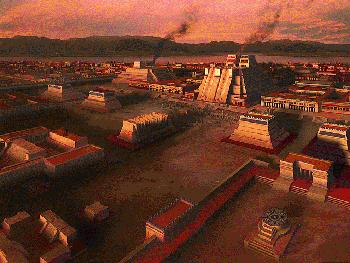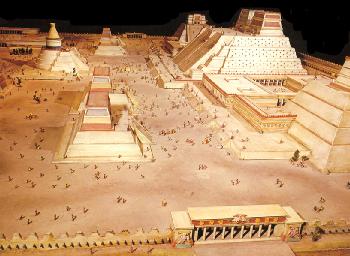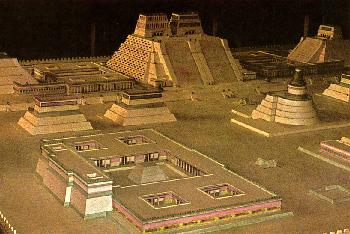|
| |

The Great Aztecs
The story of the Aztecs' rise to power is awe inspiring one,
and is one of the most remarkable stories in world history. They were
a relatively unknown group of people who came into the Valley of Mexico
during the 12th and 13th century A.D., and rose to be the greatest power
in the Americas by the time the Spaniards arrived, in the 16th century.
Very little is known of the earliest Aztecs, they did not keep a written
record. Their history was passed on by word of mouth from one
generation to the next. Legend has it that they came from an Island
called Aztlán, meaning "White Place" or "Place or Herons".
In the Aztec codex "Tira de la Peregrinación," commonly called
the "Migration Scrolls." The scrolls have the Aztecs leaving
Aztlán, which was described as an island in a lake with
Chicomoztoc depicted as seven temples in the center of the island. The
Aztecs felt they were the "chosen people" of Huitzilopochtli. The Aztecs
believed Huitzilopochtli their war god was their protector, how had them
search for their "promised land."
Sometime during the 12th & 13th century the Aztecs straggled into the
Valley of Mexico, led by their chieftain Tenoch. They were a poor,
ragged people who survived on vermin, snakes, and stolen food. They
were hatred and rejected by all the surrounding inhabitants of the
valley, for their barbarous and uncultured habits. They were driven from
one location to another. Early in the 14th century, Huitzilopochtli told
Tenoch to lead his people to a place of refuge on a swampy island in
Lake Texcoco. When they reached their destination, they were to look
for an eagle perched on a cactus, growing from a rock or cave surrounded
by water. At that location, they were to build their city and honor
Huitzilopochtli with human sacrifices. The city they built was
called Tenochtitlán, the city of Tenoch.

Tenochtitlán
In the beginning stages of Tenochtitlán, development,
Aztec life was very difficult in their undesirable location.
Tenochtitlán was located on a marshy island with limited
resources, they built a few thatch and mud huts, and some small temples.
The Aztecs would have to work constantly to maintain a city on swampy
land. There was also continuing tensions between the Aztecs and the
neighboring peoples on the mainland who despised them. Despite
these obstacles, the Aztecs worked hard to improve the quality of their
lives. They adopted an agricultural system of farming called the
Chinampas. and in a short period of time, the land was transformed into
a fertile and highly productive island.
As the Aztec empire expanded, specialized craftsmen and common laborers
were brought to Tenochtitlán to expand the city. Since it was
built on swamp land, large wooden stakes were driven into the soft
ground to provide secure foundations for the new buildings. They
were able to use the stone Tezontli to construct the buildings on the
unstable ground. Despite these precautions, the larger temples and palaces
would often sink below ground level. As a result, the older building were
continuously repaired or rebuilt with the newer structures built over the
older core.
By 1376, the Aztecs knew that they had to select a
emperor of royal lineage, to gain respect of their neighbors.
With political genius, they chose a man by the name of Acamapichtli
as their emperor. He was related to the last rulers of Culhuacán,
and his lineage extended back in time to the great Toltec ruler
Quetzalcóatl. With the selection of Acamapichtli as the Aztecs
first true emperor, their were able to claim descendency from the
great Toltecs.
During the 15th century the military strength of the Aztecs increased.
They grew from a small tribe of mercenaries into a powerful
and highly disciplined military force. They also formed alliances with
their powerful neighbors Texcoco and Tacuba, known as
the Triple Alliance. It was a time for building and the city
Tenochtitlán grow and prosperd.

|
|
|
|




